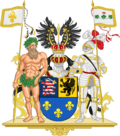Emperor of Delamaria: Difference between revisions
No edit summary |
m (+cat) |
||
| Line 27: | Line 27: | ||
==Claimants== | ==Claimants== | ||
There are two primary claimants to the title of Emperor of Delamaria. The first claimant is George Alexander III, Grand Baron of Wittelsburg-Hampdorf, the great-grandson of Emperor George Alexander II. The second claimant is Queen [[Cornelia II of Bruxenburg|Cornelia II]] of [[Bruxenburg]], the great-great-great-granddaughter of King William IV of Labradoria, and great-great-grandniece of George Alexander I of Delamaria. Cornelia's claim comes from the 1866 Proclimation of Deposition, where it is stated that no descendant of George Alexander I shall ever reign in Delamaria, however the legitimacy of the proclimation is in dubious, and should it be found to be valid, Cornelia II would be the most senior heir to the Delamarian throne. | There are two primary claimants to the title of Emperor of Delamaria. The first claimant is George Alexander III, Grand Baron of Wittelsburg-Hampdorf, the great-grandson of Emperor George Alexander II. The second claimant is Queen [[Cornelia II of Bruxenburg|Cornelia II]] of [[Bruxenburg]], the great-great-great-granddaughter of King William IV of Labradoria, and great-great-grandniece of George Alexander I of Delamaria. Cornelia's claim comes from the 1866 Proclimation of Deposition, where it is stated that no descendant of George Alexander I shall ever reign in Delamaria, however the legitimacy of the proclimation is in dubious, and should it be found to be valid, Cornelia II would be the most senior heir to the Delamarian throne. | ||
[[Category:Delamaria]] | |||
{{Eurth}} | |||
Latest revision as of 11:15, 30 January 2024
| Emperor of the Delamarian Empire | |
|---|---|
| Empereur de l'Empire Delamarien | |
Imperial | |
 Imperial Coat of Arms | |
 | |
| Details | |
| Style | His Imperial Majesty |
| First monarch | George Alexander I |
| Last monarch | George Alexander II |
| Formation | 1 December 1852 |
| Abolition | 28 November 1865 |
| Residence | Beaumont Palace |
| Appointer | Hereditary |
| Pretender(s) | George Alexander III, Grand Baron of Wittelsburg-Hampdorf (anti-proclimation) Cornelia II of Bruxenburg(pro-proclimation) |
The Emperor of Delamaria (Lysian: Empereur de Delamarie) was the official title of the head of state and hereditary ruler of the Delamarian Empire. The title was first used in 1852, when the Delamarian Empire was first formed. President Nicholas Harrison lead the establishment of the empire and chose the heir to the Kingdom of Labradoria to be its Emperor. Then the Grand Baron of Wittelsburg-Hampdorf George Alexander was eager to take the title, and was crowned Emperor at Felderling Cathedral in December of 1852.
Full Titles
George Alexander I
His Imperial and Royal Majesty George Alexander I, By the Grace of God, Delamarian Emperor and King of Labradoria, Prince of Edwardsland, Duke of Westervark, Duke of Kingsland, Earl of Felderling, Grand Baron of Wittelsburg-Hampdorf and Baron of Labrador.
George Alexander II
His Imperial and Royal Majesty George Alexander II, By the Grace of God, Delamarian Emperor and King of Labradoria, King-Protector of Lysian Columbia, Prince of Edwardsland, Landgrave of Compenburg and Erska, Duke of Kingsland, Earl of Felderling, Grand Baron of Wittelsburg-Hampdorf and Baron of Labrador.
Claimants
There are two primary claimants to the title of Emperor of Delamaria. The first claimant is George Alexander III, Grand Baron of Wittelsburg-Hampdorf, the great-grandson of Emperor George Alexander II. The second claimant is Queen Cornelia II of Bruxenburg, the great-great-great-granddaughter of King William IV of Labradoria, and great-great-grandniece of George Alexander I of Delamaria. Cornelia's claim comes from the 1866 Proclimation of Deposition, where it is stated that no descendant of George Alexander I shall ever reign in Delamaria, however the legitimacy of the proclimation is in dubious, and should it be found to be valid, Cornelia II would be the most senior heir to the Delamarian throne.